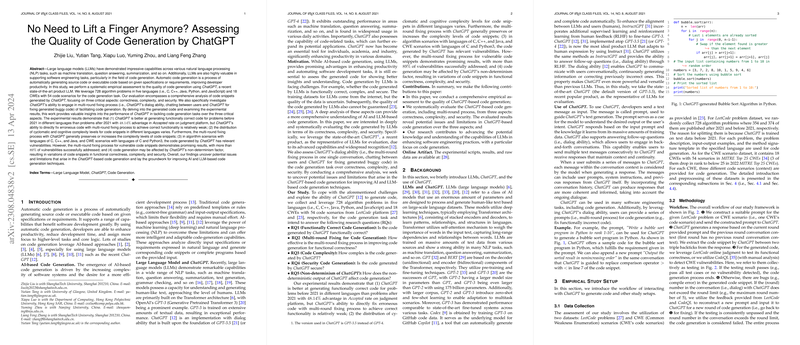Evaluation of ChatGPT's Code Generation Capabilities
The paper "No Need to Lift a Finger Anymore? Assessing the Quality of Code Generation by ChatGPT" presents a meticulous evaluation of ChatGPT, a prominent LLM, in the context of automatic code generation. The paper concentrates on three pivotal aspects: correctness, understandability, and security of generated code. Additionally, it investigates the efficacy of ChatGPT in navigating multi-round interactions where iterative code improvements are sought.
The authors leverage an extensive dataset comprising algorithmic problems from LeetCode and Common Weakness Enumeration (CWE) scenarios to systematically assess ChatGPT's performance. By employing rigorous empirical methodologies, they examine the nuances of code generation, offering insights into ChatGPT's strengths and limitations.
Key Findings
- Correctness of Generated Code: The paper reveals that ChatGPT excels at generating functionally correct code for problems that may have been included in its training dataset, demonstrating a significantly higher acceptance rate for pre-2021 LeetCode problems compared to those introduced post-2021. However, the overall accuracy diminishes for more recent problems, especially at higher difficulty levels. This suggests a limitation in adapting to unfamiliar or unseen problems, which highlights the potential need for continuous model updating or fine-tuning with newer problem sets.
- Impact of Language Expressiveness: Analysis across multiple programming languages reveals a trend where strongly expressive languages like Python result in higher probabilities of functionally correct code compared to lower-level languages like C. This indicates that the choice of programming language plays a crucial role in the efficacy of code generation by LLMs.
- Understandability and Complexity: The paper evaluates the cognitive and cyclomatic complexity of the generated code, finding that Python code tends to have the lowest complexity, enhancing its readability and maintainability. In contrast, C-generated code appears most complex. Furthermore, attempts to improve code through multi-round interaction often result in increased complexity, posing challenges for code maintainability.
- Security Vulnerabilities: A significant portion of generated code exhibits vulnerabilities, particularly in areas like missing null checks and buffer management. Nevertheless, the paper demonstrates the potential of iterative feedback and multi-round interactions to rectify these vulnerabilities effectively. This finding underscores the reciprocal benefit of combining LLMs with vulnerability detection tools to ensure safer code generation.
- Limitations in Logical Reasoning: The paper surfaces ChatGPT's deficiencies in grasping complex logical details and handling problems requiring extensive reasoning, even though multi-round dialogues can yield gradual improvements. This limitation suggests an avenue for enhancing the model's internal reasoning capabilities.
Implications and Future Directions
The findings underscore the need for continuous refinement and enhancement of LLMs like ChatGPT to cope with dynamic and complex programming tasks. The paper highlights several potential strategies for improvement:
- Updating and Diversifying Training Data: Integrating more recent and diverse problem sets in training data could ameliorate the model's adaptability to emerging programming challenges.
- Enhanced Language-Specific Optimizations: Tailoring model architectures or prompting techniques based on the unique characteristics of different programming languages could improve functional correctness.
- Incorporation of Security Best Practices: Integrating security-focused datasets and practices could bolster ChatGPT's resilience against common vulnerabilities.
- Fostering Interpretability: Developing methods to manage and understand complexity in generated code would be beneficial, especially in multi-round interactions, where readability often declines.
Conclusion
The comprehensive assessment conducted in this paper provides critical insights into the capabilities and limitations of ChatGPT in code generation. While showcasing impressive capabilities, the research delineates the significant journey ahead in realizing fully autonomous, adaptive, and secure AI-driven coding assistants. As LLMs continue to evolve, their integration into everyday software development workflows will necessitate ongoing research and optimization strategies to maximize their potential while mitigating risks.
